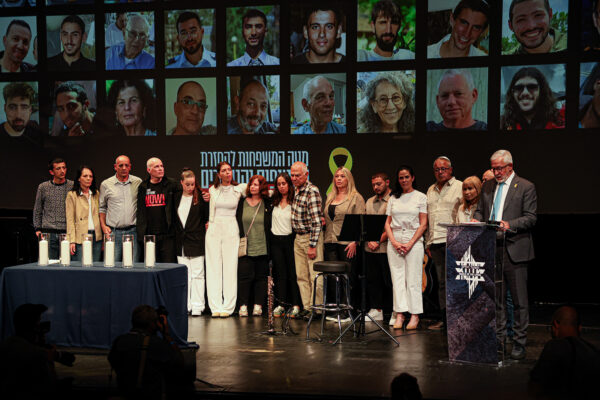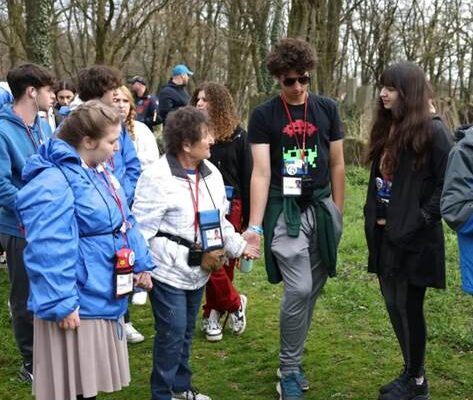
March of the Living Leaders at the entrance to the POLIN Museum in Warsaw, Poland
It was a Friday morning in early May – I had taken the express train from Krakow to Warsaw to get to my March of the Living Canada group’s hotel early for check-in. My co-staff stayed in Krakow with the group and she was responsible for taking them through Plaszow; they then needed to make it to Warsaw in time to visit the POLIN Museum, a new museum of the History of Polish Jews, and get to the hotel to prepare for Shabbat.
While checking my group into our hotel in Warsaw, I get a call from my co-staff telling me that they had hit about 2 hours of unforeseen traffic due to a road closure. With almost no hesitation, I told her that we would cancel our one-hour appointment at the POLIN museum in order to avoid rushing for Shabbat. The perfect solution.
As the idea sunk in days later, I realized I may have made a mistake. That upcoming July, I would once again be in Warsaw, this time with 11 other colleagues, representing the International March of the Living at a training seminar, in partnership with the POLIN Museum. How on earth would I contribute to this 1-week intensive program if I didn’t even bring my delegation to the museum?!
~~~~
That July, I arrived in Warsaw and entered the POLIN Museum with my tail between my legs. Realizing that I had absolutely no idea what I had committed myself to, I was gradually beginning to think I hadn’t thought this decision through properly. What began as a deep feeling of uncertainty and regret for schlepping across the world for something I thought I couldn’t contribute to, quickly became one of the most powerful and transformative experiences, both professionally and personally. It was so much more than just a conference – it was one of the most impactful educational and professional experiences I have had in my career at MOL.
March of the Living brought 12 professionals together to work with a team of guides from the POLIN museum with the mutual goal of enhancing the educational experience for students on the March of the Living. The guides, the experts in the exhibit, and MOL staff, the experts in the program and the students, sought to prepare a guided experience that would achieve the goals of the museum, while speaking to the experience of the Marchers. We were divided into groups, MOL and POLIN guides together, and worked in teams each day to produce a unique finished product. Though we had achieved what we had sought out to do, my greatest accomplishments had nothing to do with the piece of work I created with my teammates.
~~~~
At the end of a long day in the middle of our weeklong program, one of the guides offered to take my colleague and me around her neighborhood in Warsaw where she grew up. Though we had really wanted to go, it was pouring rain, it was cold, it was 9pm, and we hadn’t yet eaten dinner. None of the other participants had taken her up on her offer though, and she had already arranged for her husband to look after her son so she could guide us; how could we say no?
We shuffled into a cab and began our tour, getting in and out of the rain to see sights in the dark. Our last stop before heading back to the hotel was the apartment where she grew up. We stepped out of the cab and huddled under my broken umbrella to stand by the front entrance of the apartment building. “I am Catholic”, she began. On the one hand I was surprised, because we were here, members of a Jewish organization, working at a museum which chronicles 1000 years of Jewish history in Poland. The only people I really ever encountered in Poland were Jewish. On the other hand, why would she be Jewish? In the 5 times I had been to Poland, I had never met another Jew other than the Marchers I encountered. The irony was beginning to confuse me.
“I was raised here and we lived with my grandmother who was such an important person in my life. When I walk by now, I can still imagine her at the window telling me to come in and get ready for dinner.” She points to a small park across the street. “I used to play here each day after school. It is also the sight where one of the three milk cans of the Ringelblum archives was found. We are standing in front of a major historical discovery! Just today I was given the authority to form a committee which will create a memorial for Ringelblum on this very sight”. When I asked her why she was pouring all of her energy into ensuring that this memorial be erected, her answer was immediate and simple. “You are Jewish, and you are here to commemorate your roots. I am Catholic, but the story of the Holocaust is just as much a part of my narrative as it is yours. I grew up right here, within the borders of the Warsaw Ghetto.” I was blown away on so many levels. She was so right though – I had never thought about this. Ever.
Later that week, our group was invited to the JCC in Warsaw. Nestled in what felt like the back courtyard behind a bustling street of shops and restaurants, stood this very small art deco, ‘hipster-ish’ building. We piled in, sat down and were introduced to the director. A young woman in her mid 20’s, Jewish – traditional but secular at the same time, spoke to us. We learned about the Jewish community today and how they access the JCC as one of the anchors to ground them and serve as the bridge between their heritage and their current Polish-Jewish culture. I had never spoken to a woman in my generation, wearing the same clothes as me, who was Jewish, who went on Birthright, using the same iPhone as me, wearing the same magen david necklace and red string bracelet as me, who lived in Poland.
I was beginning to realize that when we embark on the March of the Living each year with our students, we aren’t going to Poland simply to celebrate life and commemorate loss of what was, but that we are going back to reconnect with what is –
While walking through the galleries in POLIN, we learned about what was left of the 3.5 million Jews who lived in Poland before WWII. After the 3 major migrations out of Poland after the Holocaust, there were about five thousand Jews remaining. At this point, I had a choice. I could focus on what was lost, and continue to perpetuate this in the messaging of our program, or I could shift my focus onto something different. There were five thousand Jews left, but today there are over twenty thousand Jews. Who are they? What has life been like in Poland over the past 70 years? How do they live, where do they go to shul, what is Jewish education like, how do they celebrate the holidays? Gone are the days when our parents sent us on MOL with no Zloty because ‘heaven forbid you should spend one penny in that country’.
~~~~
So what were my accomplishments? I became a change agent for the Canadian delegation of MOL. Together with my colleagues, we decided to expand our focus and learn about Jewish life in Poland today. We broke down barriers, debunked theories, eliminated preconceived notions, and sat at the table with individuals who we never thought we’d encounter, but who we can now call friends. By doing this, we are ensuring that history doesn’t repeat itself, one person at a time. We strive to breed tolerance, open mindedness and acceptance in our students – in order to do this authentically, we need to, at the very least, endorse this ourselves and by connecting with our Jewish brothers and sisters in Poland today, we can ensure a brighter and stronger future for tomorrow.
The process of ‘unlearning’ what we have been trained to view of contemporary Poland, and beginning a dialogue with Poland (Jewish and non-Jewish) may be a long and challenging journey, but it starts today and it starts with our groups – it starts with me.
So as I arrive home from New York after a 2-day conference with my colleagues around the world, I take home with me my finalized Poland itinerary for MOL 2017.
On Friday April 21, 2017 the Montreal delegation will be spending not one, but two hours at the POLIN museum, using the guided curriculum that I created with my team. We will then head back to our hotel to prepare for Shabbat and welcome our dinner guests; a group of Polish Jewish high school students.
Written by Ali Newpol, Director of March of the Living Canada.








